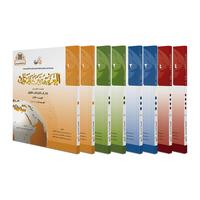٢٫١١٫١٣١ - الإسلام - كيف تفهم الإسلام فهما صحيحا
2.11.131 – Islam – Wie man den Islam richtig versteht
2.11.131 - Islam - How to properly understand Islam
2.11.131 - Islam - Cómo entender correctamente el Islam
2.11.131 - Islam - Comment bien comprendre l'Islam
2.11.131 - Islam - Come comprendere correttamente l'Islam
2.11.131 - Islam - Hur man förstår islam korrekt
2.11.131 - İslam - İslam nasıl doğru anlaşılır
2.11.131 - 伊斯兰教 - 如何正确理解伊斯兰教
كارلس: أريد أن أسألك عن الإسلام.
Carlos: I want to ask you about Islam.
هل يضايقك ذلك؟
Does that bother you?
Est-ce que ça te dérange?
Bu seni rahatsız ediyor mu?
أحمد: يسعدني ذلك، وأرحب بأسئلتك.
Ahmed: Darüber freue ich mich und freue mich über Ihre Fragen.
Ahmed: I am happy about that, and I welcome your questions.
Ahmed : Je suis heureux de le faire et je suis ouvert à vos questions.
Ahmed: Bundan memnunum ve sorularınızı memnuniyetle karşılıyorum.
كارلس: هل كان نبيكم محمد أميا؛ لا يقرأ ولا يكتب؟
Carlos: Was your Prophet Muhammad illiterate? He does not read and he does not write?
Carlos : Votre prophète Mahomet était-il analphabète ? Il ne lit pas et il n'écrit pas ?
Carlos: Sizin Peygamberiniz Muhammed okuma yazma bilmiyor muydu? Okumuyor ve yazmıyor mu?
أحمد: نعم، هذا صحيح.
Ahmed: Yes, that is correct.
كانا نبيا أميا.
They were an illiterate prophet.
C’était un prophète illettré.
كارلس: إذن كيف أتى بهذه الحقائق العلمية، التي لم يكن الناس يعرفونها في زمنه، وأثبتها العلم اليوم؟
Carlos: So how did he come up with these scientific facts, which people did not know in his time, and which science has proven today?
Carlos : Alors, comment est-il arrivé à ces faits scientifiques, que les gens ne connaissaient pas à son époque et que la science a prouvés aujourd'hui ?
أحمد: لم يأت بتلك الحقائق العلمية من عنده.
Ahmed: He did not come up with these scientific facts from himself.
Ahmed : Il n’a pas inventé ces faits scientifiques tout seul.
بل هي من عند الله.
Rather, it is from God.
وهذا دليل على أنه رسول.
This is proof that he is a messenger.
C'est la preuve qu'il est un messager.
كارلس: سؤال آخر: هل الإسلام دين العرب وحدهم؟
Carlos : Une autre question : l’Islam est-il la religion exclusive des Arabes ?
أحمد: الإسلام دين الناس جميعا، في كل زمان ومكان.
Ahmed: Islam is the religion of all people, at all times and places.
Ahmed : L’Islam est la religion de tous, à tout moment et en tout lieu.
انظر إلى المسلمين في كل العالم، إنهم شعوب مختلفة في لغاتهم وأعراقهم وألوانهم.
Look at Muslims all over the world, they are different peoples in their languages, races and colors.
Regardez les musulmans du monde entier : ce sont des peuples différents par leur langue, leur race et leur couleur.
كارلس: أنا لا أفهم الإسلام فهما صحيحا.
Carlos: I do not understand Islam properly.
أحمد: لأنك تعتمد في معلوماتك وآرائك دائما على كتاب معادية للإسلام اقرأ لكتاب مسلمين أو محايدين يقولون الحقيقة.
Ahmed: Because you always rely on anti-Islam writers for your information and opinions, read Muslim or neutral writers who tell the truth.
Ahmed : Parce que vous comptez toujours pour vos informations et vos opinions sur des livres anti-islamiques. Lisez des écrivains musulmans ou neutres qui disent la vérité.
Ahmed: Bilgi ve görüşleriniz için her zaman İslam karşıtı yazarlara güvendiğiniz için, doğruyu söyleyen Müslüman veya tarafsız yazarları okuyun.
كارلس: ومن هؤلاء الكتاب المحايدون؟
Carlos: Who are these neutral writers?
Carlos: Kim bu tarafsız yazarlar?
أحمد: إنهم كثيرون، ومنهم: العالم الفرنسي موريس بوكاي، والعالم الأمريكي مايكل هارت، والمؤرخ البريطاني توماس آرنولد.
Ahmed: They are many, including: the French scientist Maurice Bucay, the American scientist Michael Hart, and the British historian Thomas Arnold.
Ahmed : Il y en a beaucoup, parmi lesquels : le scientifique français Maurice Bucaille, le scientifique américain Michael Hart et l'historien britannique Thomas Arnold.
Ahmed: Pek çok kişi var: Fransız bilim adamı Maurice Bucay, Amerikalı bilim adamı Michael Hart ve İngiliz tarihçi Thomas Arnold.
كارلس: سأقرأ لهؤلاء الكتاب.
Carlos: Ich werde diese Bücher lesen.
Carlos: I'm going to read those books.
أحمد: إذا ستعرف عن الإسلام الشيء الكثير.
Ahmed: Then you will know a lot about Islam.
Ahmed: O zaman İslam hakkında çok şey bileceksin.

